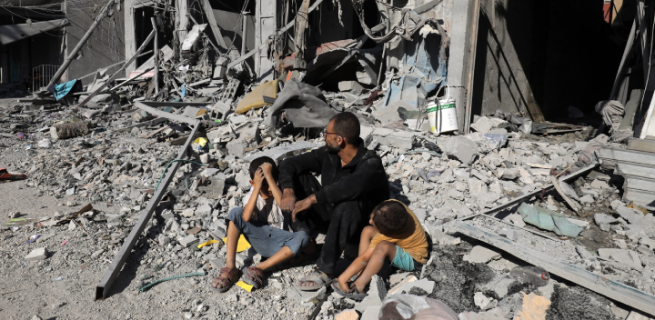By Paul Gregoire and Ugur Nedim
Coming into effect on 1 July 2002, the Rome Statute of the International Criminal Court established not only the ICC, but it sets in place the four core international criminal offences of genocide, crimes against humanity, war crimes and the crimes of aggression.
The treaty applies to 123 states. The state of Palestine is a party to it, although Israel is not. And Australia ratified the agreement on the day it took effect, which required it to establish three international crimes in domestic law. And these came into force on 1 September 2002.
As the Australian federal police explains, these laws carry universal jurisdiction, meaning this nation can prosecute any individual for the commission of any such offence having been perpetrated anywhere on the planet.
However, the federal law enforcement agency further outlines that it wouldn’t usually investigate international crimes committed overseas, unless the country where they were perpetrated is unable or unwilling to prosecute themselves.
In a similar manner, the ICC only steps in to prosecute such crimes when national courts are unwilling or unable to do so, as it’s “a court of last resort”.
And the ICC is currently investigating a number of matters, including the situation in the state of Palestine: an inquiry which commenced on 3 March 2021.
International jurisdiction
In June 2002, the Howard government passed the International Court Act 2002 (Cth), which established the ICC jurisdiction locally, while consequential amendments passed at the same time, inserted three core international crimes into the Criminal Code Act 1995 (Cth), under division 268.
Then attorney general Daryl Williams told parliament on tabling the bill that its purpose was “to create, as offences against the criminal law of Australia, each of the offences over which the International Criminal Court has jurisdiction – genocide, crimes against humanity and war crimes”.
The Rome Statute didn’t establish the crime of aggression in 2002 due to disagreements about a definition. And while the ICC gained the ability to prosecute such offences in 2018, the 2010 amendments that provided for this haven’t been ratified by this country.
In inserting division 268 into the Criminal Code, the bill created dozens of new offences as each core international crime covered can be violated in a multitude of ways.
And the ICC would only step in to prosecute an Australian international crime in cases where this nation is not prepared to.
“These offences apply regardless of whether the conduct occurred in Australia or not, and regardless of whether the person is an Australian citizen or not,” Williams further made clear.
“In this way, Australia can never become a safe haven for the perpetrators of the most serious international crimes.”
Core international crime
The core international crime of genocide is set out under sections 268.3 through to 268.7. Genocide involves the purposeful killing of individuals belonging “to a particular national, ethnical, racial or religious group”, in order to try and destroy that group, “in whole or in part”.
The crimes of genocide include genocide by killing, genocide by causing serious harm, genocide by inflicting destructive life conditions, genocide by the prevention of births and genocide by forcibly transferring children. Each of these crimes carries a maximum penalty of life imprisonment.
Sections 268.8 through to 268.23 of the Criminal Code contain crimes against humanity. And these involve offences committed as part of “a widespread and systematic attack against a civilian population” and the perpetrator is acting as part of a larger attack by an organisation or state.
The crime against humanity of persecution is contained in section 268.20 of the Criminal Code. The offence involves a person committing another international crime against a “person or persons by reason of the identity of a group or collectively or targets the group or collectively as such”.
Persecution is a form of collective punishment, which, while not appearing as a standalone offence, is criminalised under international and federal law. And this crime carries a maximum penalty of up to 17 years in prison.
Section 268.22 of the Criminal Code contains the crime of apartheid, which is the perpetration of inhumane acts “committed in the context of an institutionalised regime of systematic oppression and domination by one racial group over any other racial group or groups”. This also carries 17 years.
The Code further contains the offences that constitute a war crime, under sections 268.24 through to 268.34. A war crime is committed “in the context of an international armed conflict against a person or property protected” under the Geneva Conventions.
Drafted in 1949, the four Geneva Conventions form the core of international law, via the regulation of conduct during an armed conflict, in an attempt to lessen the impact of war. And the documents stipulate the rights of prisoners of war, civilians and military personnel during such conflict.
War crimes include wilful killing, torture of a protected person, the inhumane treatment of protected people, the causing of great suffering, biological experiments, pillaging, destroying protected objects, as well as rape and enforced sterilisation.
Outstanding prosecutions
Due to rumours of Australian special forces having perpetrated war crimes in Afghanistan, the Chief of the Army asked the Inspector General of the Australian Defence Forces to investigate the matter in 2016, which led to the establishment of the Brereton inquiry.
Published in November 2020, the Brereton report referred “36 matters comprising 23 incidents and 19 individuals” to the AFP for investigation. Yet, so far, only one of the ex-service personnel has been charged with war crimes, which involved former SAS officer Oliver Shultz being arrested in March.
And while the government appears to be dragging its feet on charging those involved in the other alleged crimes identified by Brereton, it continues to prosecute ex-ADF lawyer David McBride over his blowing the whistle on the Afghan war crimes to the ABC around the time the inquiry began.
McBride’s trial commences on 13 November. He’s facing up to life imprisonment for having spoken out on corruption in the public interest.











